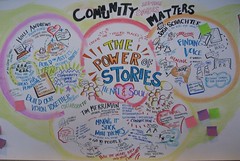
Scholarly work on storytelling as a device to enhance the learning experience of students has shown the value of introducing learners to storytelling techniques. Some researchers have explored the use of storytelling to advance learning in the workplace (Swap et al 2001). For those of us who have been trained in the qualitative research methods, narrative inquiry (Clandinin and Connelly 2000) is a key strategy that helps us advance our understanding of individual and collective behaviour.
Egan (1989) championed the use of storytelling as a non-mechanistic approach to teaching. It is clear to me, from the works I have reviewed while thinking about this topic, scholarly research has been and continues to be undertaken on how storytelling can be successfully in teaching contexts, and as a qualitative research strategy. It recently all “clicked” in my brain when I realized that I have been doing a lot of storytelling both in my teaching and in my research. And I wanted to pass that on to my own students.
My former doctoral supervisor, someone I profoundly respect as a scholar and as an educator, taught me always to look at data with a rigorous and analytical mind, and to tell a story around the data. He asked me to look at data and think critically and make sense of it. And that’s how I conduct research, and how I hope my own students will undertake theirs. I told my students recently that I want them to do rigorous research, empirically-grounded and theoretically-informed.
In the classroom, I tell my students stories around the topics I research and the relevance of those research projects for the advancement of our understanding of comparative environmental and public policy. And the interesting thing is, my students react very positively to storytelling. This week, I taught a class in “full low-tech mode” (e.g. without any power point nor visuals, only the chalkboard and my own voice). I drew a road map of what I wanted my students to learn and as I was drawing the pieces of the puzzle, I put them together in an overview for them to see.
Students reacted extremely well, some even to the point of commenting “dear Dr. Pacheco-Vega, I really prefer low-tech classes”. I will continue to mix technology-supported lectures with “low tech” ones, but the experience really left me pondering on how valuable storytelling can be in my own teaching, and how much of it I use in my own research.

Let me tell you a little story. I have a colleague who tells a lot of stories in class. He’s funny. He tells great stories. Students laugh along with his jokes. They enjoy the course. But I often wonder how much the students learn.
I have not, repeat not, seen any data to suggest they’re not learning. But when I’ve been to his class, a non-trivial fraction of students just sit and listen. No notes, no computer. Just a empty desk. And the only time they have any opportunity to demonstrate their understanding is when he asks, “Any questions?” He does ask regularly, at least.
So, despite being engaged, the class is very instructor-centred. And from my experience as a teacher and science education researcher, it’s learner-centered activities that promote learning.
I’m not saying storytelling isn’t effective. Far from it. But I think it needs to be only one component of the lesson plan. Engaging and motivating stories interweaved with opportunities for students to practice demonstrating their knowledge.
That’s my story.
The two university profs that had the biggest impact on me – Nancy Turner and Richard Ring – did so for just that reason. They are both gifted storytellers and really brought the subject matter to life for me. I still think of their lectures fondly and remember material from them clearly, a good 15 years later.
Great post, Raul. It probably won’t surprise you that I’m a deep believer in the power of stories to convey information. We’ve been doing that since we first gathered around the campfire for a reason.
I can definitely see Peter’s / @polarisdotca’s point, but I’ll also offer a counter example from one of the most dreaded undergrad science courses at UBC: organic chemistry.
It had *seemed* like I was learning things in class. We were all studiously drawing benzene rings, and curvy arrows showing where electrons moved. But that first midterm floored almost all of us. (I distinctly remember getting a 34%).
The reason? We weren’t tested on the reactions we were taught. We were tested on reactions we weren’t taught, between molecules (characters, if you will) that we’d seen interact in other ways in class.
I’ve since likened it to being taught vocabulary and being tested on writing sentences. You could also call it a (temporary) failure of imagination on the students’ part … where we were memorizing junk instead of learning concepts. That’s on us too.
But I still think it could have been taught better. And using the tools of storytelling would have helped.